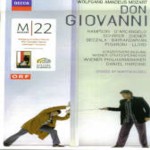This is a performance from the 2006 Salzburg Festival, a revival of a production first seen and disliked there in 2003. At least we know from the opening moments what we’re in for: Against a stark white turntable with doors and slats is a billboard featuring five women in underwear; a few moments later, 20 underwear-clad women appear and show up every so often throughout the opera. The effect is not particularly prurient or even sensual–they’re more like underwear models–but the women-as-objects point of view is made crystal clear. In this modern-dress production staged by Martin Kusej and designed by Martin Zehetgruber, there isn’t a speck of warmth, humor, or humanity. The women-in-undies are billed as “Prosperina’s Sisters” when the credits roll, and by the final scene, at the Don’s dinner, with snow falling on the pure white setting, we might just believe that hell has, in fact, frozen over, and we’ve been watching it. Hell is obviously a minimalist affair where the scene may shift and the lighting continue to surprise, but you always wind up in the same ugly place.
When Giovanni stabs the Commendatore, his blood smears on the wall. That section of wall comes back every so often (turn, turn, turn) to remind us of suffering and death, as if the production itself weren’t enough. No Seville, no trees, no food at the dinner, no scenery at all. The Cemetery offers a huge picture of the Commendatore and the 20 women with their backs to the audience; when they turn around, they have become old hags, perhaps zombies, blood pouring from their mouths. Oh yes, and still in their underwear. The Commendatore sits alone at a table in a tuxedo in the final scene and Leporello stabs Don Giovanni as the Commendatore walks off stage. I guess it makes sense if the Don has been in hell all along, but do people in hell actually die of stab wounds?
I guess I would not find this all so irritating if it shed any light on the characters. The Don is portrayed as having lost his powers and charm–he looks old and tired. But what else is new? If it’s hell, what does that say about the others? It’s all too tedious, really, and makes you long for a good, old-time, period production.
There are musical issues as well. Thomas Hampson’s voice always seemed a size too small for the title role (particularly when you recall Siepi or Ghiaurov) and by now it has lost much of its depth. He makes up in inflection what he lacks in either power or tonal beauty, and the second verse of “Deh vieni…” sounds more like a practice run-through than an attempt to be seductively smooth. As ever, his acting is thoroughly involved and concentrated–he has bought this concept hook, line, and sinker–but the performance gives little pleasure.
Melanie Diener, costumed badly as Elvira, has trouble with fast coloratura and loses the beat near the end of “Mi tradi”. She looks as unhappy as she sounds. Both Ildebrando d’Arcangelo and Luca Pisaroni as Leporello and Masetto are excellent, and would have been terrific as Don Giovanni. Christine Schäfer’s Anna, though a bit light, is fascinating–an angry woman in a constant state of anxiety. Vocally she pushes a bit, but in such an odd arena, she is an oasis of true feeling. Piotr Beczala’s Don Ottavio is big-voiced and impressive. Though dressed in a wimpy, unflattering pale blue sport coat, he delivers a fierce, enraged “Il mio tesoro”, which may contradict the music but is effective nonetheless. Isabel Bayrakdarian’s Zerlina is sexy in gold lame and well sung, and Robert Lloyd’s Commendatore still packs a wallop.
Those who heard Daniel Harding’s exciting leadership of the opera on the 1999 recording from Aix-en-Provence (on Virgin) would assume that he’d been kidnapped and replaced by someone far less energetic and musical. His tempos for the recitatives and some of the arias and ensembles here are bizarrely slow, and he speeds up for no discernible reason, turning the opera into a series of awkward, unrelated numbers. The orchestra plays with transparency but with surprisingly unappealing tone. It’s all very chilly–Boulezian, one might say. Director Martin Kusej is quoted on the DVD box as saying “we despise Don Giovanni.” This would be news to both Mozart and da Ponte, but Kusej makes it happen.
There are several better versions available on DVD, among them Muti’s from Vienna on TDK, the Met’s with Terfel and Fleming under Levine, and the fascinating, off-beat production by Peter Sellars (Decca) with Lorraine Hunt Lieberson. Both musically and dramatically any one of them is way ahead of this release. Picture (it is filmed in High Definition) and sound (PCM Stereo, DTS 5.1) are superb and subtitles are in English, Spanish, French, Italian, German, and Chinese.
































